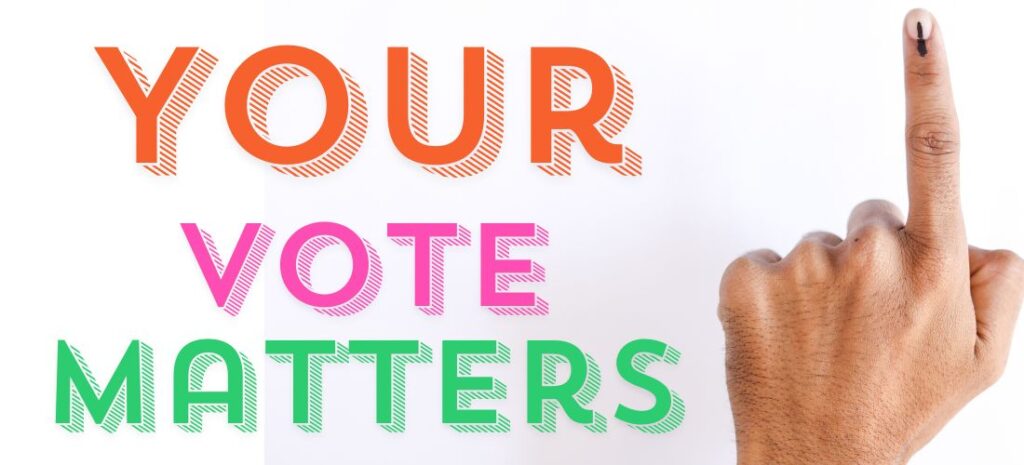In India, elections are a crucial part of democracy as they help us find a suitable representative to whom we will be accountable for any inconvenience. In simple words, voting is a process in which individuals over 18 years of age are eligible to choose their representative to form a government. Every citizen is given voting rights as they are considered essential. We have chosen a government with great care as it will affect the coming five years. The election commission conducts the elections in India and will look after all the arrangements regarding elections. In India, the voting process is done using the EVM (electronic voting machine) system and ballot paper voting. Nowadays, EVMs are considered more accessible than ballot papers as fraud is less likely. With the help of our voting rights, we can choose any representative we like and want to see as the face of the country. During the election, the party who gains the most votes is considered the winner and forms the winner. Moreover, they also make the necessary decisions and create policies that will help the citizens develop the country.
Importance of Voting

Voting has been an essential part of our country since the start, as it helps us choose our country’s best representative. A representative not only represents a party but also the whole country and the winner of the majority is later shown as the face of the country or the Prime minister. However, some of the importance of voting in India are:
- With the help of elections, the citizens can find the leader they have chosen accountable for their actions and decisions.
- The voting process helps citizens directly participate in political decision- making, and they have the power to find their representatives.
- Voting is an essential foundation that shapes the country and its landscape.
- It provides and initiates a fair and straightforward cut electoral process so that no one faces inequality and injustice.
- The voting system helps establish a system that contains political and social equality.
- With the help of the voting process, citizens have an opportunity to participate directly in political matters.
- The citizens can contribute to the growth of the country.
- Citizens can raise their issues and concerns about the system so that an effective government can be made.
- The more voters we have in the country, the more it increases the credibility of the country.
- By voting, we are fulfilling a duty given by the Constitution to every individual.
Read More: HDFC Net Banking | Federal Bank Login | DCB Net Banking | CSB Net Banking
Eligibility criteria for Voting in India
India is a diverse country, and the Constitution is the supreme law of the land that defines and influences the citizens to follow it. Constitutions contain various laws and acts which establish the rights of every citizen. However, one must follow some eligibility criteria for voting in India before voting. So here are the eligibility criteria for a voter:
- The person must be a citizen of India.
- The individual must be years or older on the qualifying date (1st January of the year of revision of the electoral roll).
- The person must be an ordinary resident of the constituency area where you want to be enrolled.
- The individual must be in a proper mind to elect a member after thinking.
- The individual must have no criminal background and have credibility.
Who is Not Eligible for Voting in India?
Voting is for every individual in India, but there are certain circumstances when people fail to vote. However, some of the reason that leads to the rejection of your vote are:
- NRI (non-resident Indian) individuals.
- A person who has a criminal background.
- Who is in jail or prison for committing a crime.
- A mentally unstable person.
- The person who is less than 18 years old.
You can also check your voting status online or offline. You must visit the National Voter’s Service Portal (NVSP) ‘s official website (https://voters.eci.gov.in ). For offline, you need to contact the electoral registration office in your area.
Read More: Eligibility criteria for Yes Bank Net banking
What are the Voting Rights in India?

Voting is a crucial part of any democratic system because it tells us about the country’s future and how it will affect the individual and the society. However, individuals have some voting rights in India, such as:
- The elections should be free from any fraud and bias. Everything should be done transparently and fairly.
- Every citizen above the age of 18 has a right to pay.
- Votes should be thrown secretly so no one knows whom you choose.
- The citizens have the complete right to gain information about the parties, representatives, etc.
- There should be no discrimination against the candidates based on caste, racism, religion, etc.
- The voters have a complete right to complain to the commission if they find anything suspicious or unfair.
- The Constitution provides an opportunity for the citizens to be a part of political discussion for better functioning.
- The Voter can choose any representative according to their choice whom they find best.
How to Vote in India?
India is a democratic country, and elections are held every five years at intervals. However, while voting, the citizens must follow some of the steps necessary for the effective voting process. Here are the steps of how you can vote.
- The citizen must meet all the requirements that the election commission provides.
- The citizens have to apply for voting registration before thinking of voting.
- You have to gain all the information about the polling station.
- The citizens have to find the location where they have to vote. Polling stations may vary every year.
- You have to join a queue and wait for your chance. Once you get It, you can go through your vote.
- You have to vote on the EVM machine according to your choice of whom you want to vote for.
- Once you cast your vote, you can mark your finger with the officer.
Online Voter Registration Process in India

Online voter registration provides various convenient ways to vote and enrol. The National Voter’s Service entry site provides Form 6, which candidates have to fill out and submit to their electoral registration office in their local area. After the process, the applicant’s name was added to the voter list. This method is similar for common voters, non-resident Indians, and benefit voters. The steps for the online voter registration process are given below:
- Step 1: First, visit the NVSp website or Voters service portal (https://voters.eci.gov.in).
- Step 2: You’ll find a form in the menu. Click on it and download Form 6.
- Step 3: Fill out the form carefully with all the necessary details.
- Step 4: Submit your filled form to the electoral registration office.
- Step 5: Once the verification is started based on the details you have filed in the form, you must wait patiently.
- Step 6: After successful verification. Your name was added to the Voters list, and later, you received your voter ID.
Read More: Apply Online for CSP at Bandhan Bank | Apply Online for UCO Bank CSP
Offline Voter Registration Process
You can even register your voter ID offline if you are still familiar with online registration. Some of the steps you have to follow:
- Step 1: Firstly, approach the booth level officer’s office (BLO).
- Step 2: Take form number 6 from (BLO).
- Step 3: Fill all the necessary details correctly in form 6
- Step 4: Now submit all the documents written in Form 6, such as an Aadhaar card, birth certificate, and photos.
- Step 5: Once you submit all the documents, booth-level officers (BLO) will verify your form and documents.
- Step 6: After successful verification, you will receive your ID.
Conclusion
We have always heard that voting is a right the Constitution provides to every individual. Still, if we look at it, we will see that the voting process is a task and a responsibility that helps define our country’s future. We have provided various features while voting for the representative, but the first thing that is necessary for us is to choose which can help and initiate the country’s growth. Once we determine a representative, we must follow their rules, so we must choose the representative who will make you feel worthy and respect your opinion. However, every citizen must actively participate in the voting process because we hold the representative accountable for our growth only. Choose a representative who thinks about society, not only for themselves. We have discussed all the essential information about the voting process in India. This will help you with your subsequent voting.
Read More: Karnataka Bank Net Banking | IDFC Net Banking | ICICI Net Banking



